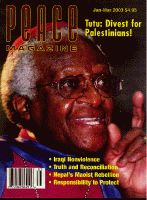
Peace Magazine Jan-Mar 2003, page 21. Some rights reserved.
Search for other articles by Johann Christoph Arnold here
A great peacemaker leaves us with a challenge
Whenever Phil Berrigan was hauled off to jail for his latest act of civil disobedience -and it happened again and again, long after others had left the Sixties behind and returned to middle-class life - admirers across the country took heart. Here, they would say, is a man who stands by his convictions.
Others, including many who supported Phil's aims (though not his methods) raised their eyebrows and sighed. Ineffective, they murmured. Idealistic. Out of touch. Phil, who was good at defending himself, always had a comeback. But he was also humble enough to admit that to most people, "my actions over the years have constituted a theater of the absurd."
It was in the fall of 1997, and I was visiting him in a prison in Maine, where he had been arrested after leading an anti-war event at a naval shipyard. He was sure to face a hefty sentence, he told me. But, he added pointedly, he would rather spend the rest of his life in prison for his beliefs, than die "on some beach." He was seventy-four at the time, yet he spoke with such vigor that he seemed far younger.
Phil and I talked about peace, and about Jonah House, the community he and his wife, Liz McAlister, founded in Baltimore in 1973. Devoted to resisting capitalism and war, its members have been performing "works of mercy" for years, feeding the hungry, helping the homeless to find shelter, and caring for elderly shut-ins and, in later years, people with AIDS.
Like members of the Bruderhof (the community I belong to), Jonah House members have abandoned the accepted path to middle-class happiness-the route of private homes and property, careers, bank accounts, and retirement funds-in order to follow Christ in the manner of the first churches. It is a life of sacrifice and self-discipline and service- not peace, as the world thinks of it. By most standards, it is completely "unrealistic."
But what is peace? Surely it can't be prosperity-a house in the suburbs, a good job, a car, and a retirement fund -when our enjoyment of those things is dependent on the exploitation of the Third World. Surely it can't be national security, which (at least in the case of the United States) has been bought by means of the most destructive war-making machine in history.
And surely "reality" does not have to mean a world bristling with weapons, class hatreds, personal grievances, and general cynicism. For isn't there a greater reality, where all these powers are overcome?
Phil is gone now, but I suspect his answer would have been "Yes." And I am certain that would affirm these words of his wife, who wrote (around the time of my visit):
"Our hope is in God. And God's vision - more, God's promise - of a humane and just society is a promise on which we can bet our lives. But none of us can be content until this promise is a reality for all people and for all the earth. So we stake our lives on the vision of Isaiah, the day to come when people will beat swords into plowshares and spears into pruning hooks."
All in all, Phil spent eleven years behind bars. They were long, hard, lonely years. But, as Liz's letter makes clear, the couple saw them as a necessary sacrifice on the road to true and lasting peace - a goal best described here by Phil himself:
"It is that peace where domination is no more, where injustice is undone, where violence is a relic of the past, where swords have disappeared and plowshares are abundant. It is the peace where all people are treated as sisters and brothers, with respect and dignity, where each life is sacred, and where there is a future for the children. It is such a world that God calls us all to help make a reality.
"In our country this can mean going to jail, risking reputation, job, or income, and even being disowned by family or friends. Yet, in a state which daily prepares for nuclear holocaust, it also means freedom, a sense of self and vocation, and a whole new community of friends and family. In fact, it means resurrection."
Today, as the world again rushes toward war, Phil's name is being mentioned mostly in connection with his death. In some quarters his passing has been spoken of as the end of an era. But why should that be so? The struggle for justice and peace to which Phil gave his life will go on, regardless. And thus we must do more than reflect on the man. We must allow his convictions to rekindle our own.
Johann Christoph Arnold is an author and a senior minister with the Bruderhof movement. A longer version of this obituary can be read at http://www.bruderhof.com.
Peace Magazine Jan-Mar 2003, page 21. Some rights reserved.
Search for other articles by Johann Christoph Arnold here